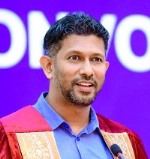in the Construction Industry in Sri Lanka:
Benefits and Challenges
FEATURED PAPER
By Rangika U. Halwatura, PhD
University of Moratuwa
Moratuwa, Sri Lanka
and
K. A. Buddhika Kodithuwakku
Copenhagen, Denmark
Abstract
Purpose
To achieve the Sustainable Development Goals new thinking is essential. This applies to every country in the world who are signatories to the 2030 Agenda that cuts across all key sectors.
Originality/value (mandatory
Though sustainable procurement practices is a developing concept in construction industry, it has the potential to enhance the performance of the sustainability aspects of the industry. However, there is minimum methodology to incorporate Sustainable Procurement elements in the construction procurement in many developing countries.
Design/methodology/approach
In the local context, an empirical study that focuses directly on this topic is yet to be carried out. Hence, a study on the sustainable procurement practices in the construction industry is timely and necessary. This study attempts to evaluate the current practices, challenges and benefits to implement the sustainable aspects during the construction procurement. For this purpose, a questionnaire survey was conducted as a mean of collecting data.
Findings
Results of the analysis revealed that “Legislation” as the main driver of implementing sustainable factors in procurement while “Lack of funding” and “un-willingness to incur higher capital cost” ranked as the main barrier for the implementation of sustainable procurement. “Reduction in harmful emissions and waste generation” ranked on top as the main benefit of sustainable procurement.
Key words: Sustainable Development Goals, Developing countries, Sustainable procurement, Construction industry
Introduction
In 2002, the United Nations marked a key milestone for sustainable development at the World Summit on Sustainable Development in Johannesburg, South Africa. Of the many pledges, one of the key declarations in the summit was “Improvement in building design and management, better mass transportation, adoption of advanced and innovative cleaner technologies, energy labelling and standards, and better public procurement policies…” (United Nations, 2002). Moreover, it was reinforced that everybody needs to take ownership to strengthen the pillars of sustainable development namely, economic development, social development and environmental protection at all levels, nationally and globally.
The Global Construction Outlook 2020 reveals that the global construction industry is projected to grow from US$7.4 trillion in 2010 to US$8.5 trillion in 2015 and to US$10.3 trillion by 2020 (Reference). The construction industry of countries in an emerging market are forecasted to continue to grow at a much faster rate. According to Construction Intelligence Centre (2016), the construction share will be above 50% from the economy in 2020. (Construction Intelligence Center, 2016). Turner and Townsend (2017) states that “Economists are calling for a significant improvement in productivity to build momentum in global economic growth, but productivity is a persistent issue for the world’s economies and the construction industry in particular which represents 6% of global GDP. The construction sector’s annual productivity improvements averaged 1% over the past two decades, compared with 2.8% for the total world economy and 3.6% for the manufacturing sector” (Turner & Townsend, 2017). Most construction companies commit to investing in productivity improvement for longer-term gains due to steady global economic growth, increasing demand for construction and a shortage of skills and labour, etc.
The Global Construction Outlook 2020 further indicates that 88% of the construction industry is planned to adopt green construction in their projects over the coming years (Reference). 60% has highlighted energy efficiency as the main influencing factor for the implementation of green construction while 77% indicated building design and construction as highly preferred areas for green construction. 69% has stated higher initial cost as the biggest challenge faced by the organization when considering the implementation of green construction projects (Construction Intelligence Center, 2016).
More…
To read entire paper, click here
How to cite this paper: Halwatura, R. U., Kodithuwakku, K. A. B. P. (2022). Incorporating Sustainable procurement Practices in the Construction Industry in Sri Lanka: Benefits and Challenges; PM World Journal, Vol. XI, Issue X, October. Available online at https://pmworldlibrary.net/wp-content/uploads/2022/10/pmwj122-Oct2022-Halwatura-Kodithuwakku-sustainable-procurement-in-sri-lanka-construction-industry.pdf
About the Authors

Rangika U. Halwatura, PhD
Moratuwa, Sri Lanka
![]()
Prof. Rangika Halwatura, PhD, BSc (ENg), CEng, MIESL is a Professor in the Department of Civil Engineering at the University of Moratuwa, Sri Lanka. He is a renowned lecturer nationally and internationally on Project Management. In addition, his academic work as well as inventions are nationally and internationally well recognized and have won many national and international level awards. His expertise areas are Project Management, Forensic Engineering, Educational philosophy, sustainable practices and material development. For more information, visit http://www.mrt.ac.lk/web/staff/dr-ru-halwatura. He can be contacted at rangika@uom.lk or rangikauh@gmail.com

K. A. Buddhika Kodithuwakku
Copenhagen, Denmark
![]()
![]()
Mr. Buddhika Kodithuwakku is an experienced charted civil engineer having over 20 years of professional experience. He has worked in different countries such as Sri Lanka, Singapore, Nepal, Bhutan, Maldives, and Pakistan and currently working as a Procurement Specialist, Construction and Infrastructure at UNOPS Headquarters in Copenhagen, Denmark. Buddhika graduated from the University of Moratuwa and obtained MSc in Construction project management. He holds a BSc (Civil Engineering, University of Moratuwa, Katubedda, Sri Lanka) and MSc (Civil Engineering, University of Moratuwa, Katubedda, Sri Lanka). Buddhika can be contacted at buddhikaK@unops.org









